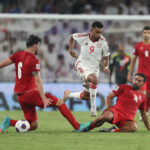Dubai – In a surprising move, the United Arab Emirates Football Association (UAEFA) has dismissed the Portuguese Paulo Bento as head coach of the national team—just hours after a dramatic 2-1 victory over North Korea kept their slim 2026 World Cup qualification hopes alive.
The decision has left many observers puzzled, as the UAE remains in contention for a direct qualification spot. They currently sit four points behind second-placed Uzbekistan in Group A of the third round of Asian qualifiers, with two matches remaining. The top two teams from each group secure automatic entry to the 2026 World Cup, co-hosted by the United States, Canada, and Mexico.
Bento, who took charge in July 2023, was relieved of his duties alongside his entire coaching staff. The UAEFA announced the decision on social media without providing further details.
,fit(960:))
Why the Sudden Move?
Despite the win over North Korea—sealed by a late stoppage-time goal—the UAE’s recent form has been inconsistent. A 2-0 loss to Iran just days earlier had already put pressure on Bento’s position.
However, the team still has a realistic chance:
- Direct qualification: If they overtake Uzbekistan in the final two matches.
- Playoff route: Finishing third or fourth would enter them into an additional playoff round for one of Asia’s eight guaranteed World Cup spots.
Bento’s Track Record
The 55-year-old Portuguese manager is no stranger to high-stakes football:
- Led South Korea to the 2022 World Cup knockout stage.
- Guided Portugal to the Euro 2012 semifinals.
- Took over the UAE after their previous coach, Rodolfo Arruabarrena, was dismissed.
Meanwhile, Iran became the first team from Group A to secure World Cup qualification after a 2-2 draw against Uzbekistan.
The sudden dismissal raises questions about the UAEFA’s long-term vision, especially with crucial matches looming. Who will replace Bento—and can they salvage the UAE’s World Cup dreams?


